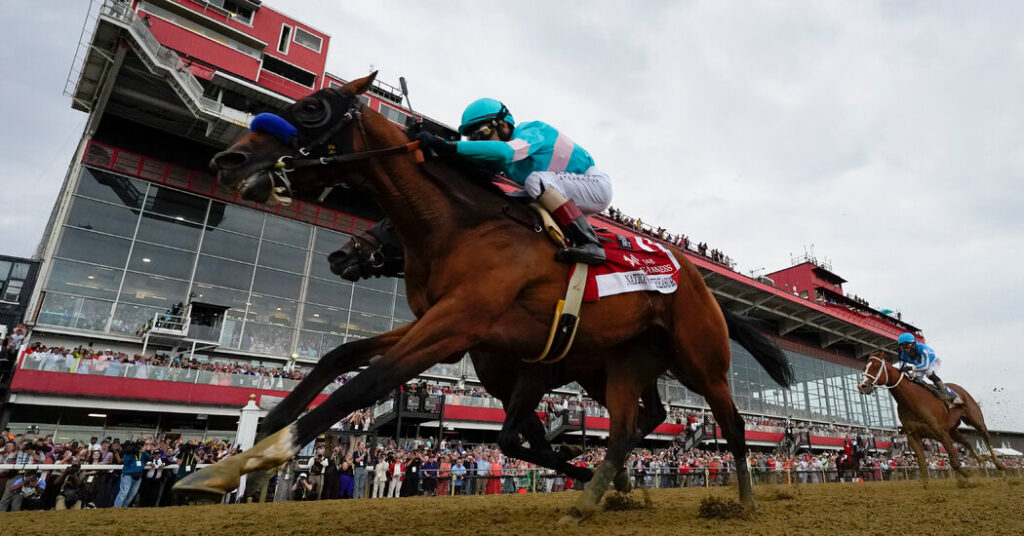Bob Baffert, the most accomplished and controversial horse trainer in America, returned to the Triple Crown trail on Saturday and watched his colt National Treasure win the 148th running of the Preakness Stakes. The victory came after Baffert’s two-year ban from the sport’s premier stage because of a doping violation, and hours after another one of his horses died competing in an undercard race at Pimlico Race Course in Baltimore.
It was the kind of afternoon that makes many Americans wonder how long America’s oldest sport can continue to have its social license renewed.
Earlier in the afternoon, another of Baffert’s 3-year-old colts, Havnameltdown, buckled around the far turn in the $200,000 Chick Lang Stakes, tumbled to the ground and unseated his rider Luis Saez.
In a grim scene that recalled the seven horses that died in the days leading to the Kentucky Derby, veterinarians swarmed to the distressed colt, erected a screen so the crowd on hand and television watchers could not look on, and euthanized him by injection.
About five hours later, a jubilant Baffert was fighting back tears as he talked about National Treasure, who edged out Blazing Sevens by a head. The Kentucky Derby winner Mage, compromised by a slow pace, finished third.
The victory was Baffert’s eighth in the second leg of the Triple Crown, breaking a record by R. Wyndham Walden, a trainer of the late 19th century. It was the first Preakness win for the Hall of Fame rider John Velazquez, a glaring hole in a résumé filled with marquee wins.
“This business is twists and turns, ups and downs,” Baffert said after National Treasure won. “Losing that horse today really hurt. I’m very happy for Johnny that he got the win. It’s been a very emotional day.”
National Treasure covered the mile and three-sixteenths in 1 minute 55.12 seconds and rewarded his backers with $7.80 on a $2 bet to win in the $1.65 million race.
“Gosh, it’s been awhile,” Velazquez said of his long-sought victory. “With all the blessings that I’ve had and all the success I’ve had in other races, not having won this one was definitely missing.”
Baffert, 70, trained Medina Spirit, who won the 2021 Kentucky Derby but failed a test for a prohibited drug, becoming only the second horse in the Derby’s history to have his victory revoked because of a drug violation. The colt died suddenly the following December, possibly from a heart attack. A necropsy conducted by California state veterinarians was inconclusive.
Baffert, a two-time Triple Crown winner, has since served a suspension handed down by Kentucky regulators and a two-year ban from the Derby and its host, Churchill Downs. Last year, Baffert was serving his Kentucky suspension during the Triple Crown, so the racing commissions in Maryland and New York kept him from the Preakness and the Belmont.
His triumphant return to Pimlico was marred by the death of Havnameltdown. The horse was euthanized by veterinarians on the racetrack after being examined by a team led by Dr. Dionne Benson, chief veterinary officer for the company that owns Pimlico.
“During the subsequent evaluation, she observed a non-operable left fore fetlock injury,” the company, the Stronach Group, said in a statement, referring to a joint in the horse’s foreleg. “Due to the severity and prognosis of the injury, Dr. Benson and her counterparts made the difficult decision to humanely euthanize Havnameltdown.”
Saez, Havnameltdown’s rider, was transported to Sinai Hospital in Baltimore after complaining of leg pain. He was in stable condition and conscious, according to the company.
Velazquez, the Hall of Famer who rode National Treasure, said he was rocked by the death on the racetrack.
“Truthfully, it felt like a knife to my heart when I saw it,” Velazquez said of the injuries to the horse and his counterpart, Saez. “It’s devastating when you see it. It’s hard to stay focused and keep going.”
After the deaths at Churchill Downs ahead of the Kentucky Derby, Preakness officials took a cautious approach to pre-race examinations. First Mission, the 5-2 second choice in the morning line, was scratched from the race early Friday morning with an unspecified left hind-ankle injury.
The extra scrutiny was extended to every horse competing over the weekend. Officials required two veterinary authorizations before a horse was allowed to run — one from the trainer’s private vet, the other from the regulatory vet in the state where the horse was stabled before coming to Baltimore.
Stronach Group officials declined to comment about how Havnameltdown was cleared to run in the race despite the extra evaluation.
Baffert, too, had no explanation.
“It’s the worst feeling,” Baffert said Saturday. “And we grieve. We do grieve when these things happen. There’s nothing worse than coming back and the stall is empty.”
Animal rights activists blamed the sport’s owners and trainers for a lackadaisical effort to protect horses.
They pointed to the opposition of horsemen’s groups to the newly minted Horseracing Integrity and Safety Authority, created by Congress under the supervision of the Federal Trade Commission, which will become the ruling body of the sport on Monday.
Kathy Guillermo, a senior vice president of People for the Ethical Treatment of Animals, said that the drug violations and fatalities among horses in Baffert’s care demanded greater scrutiny.
“Pimlico should have followed Churchill Downs’ example and barred Bob Baffert from the track,” she said.
Melissa Hoppert contributed reporting.


